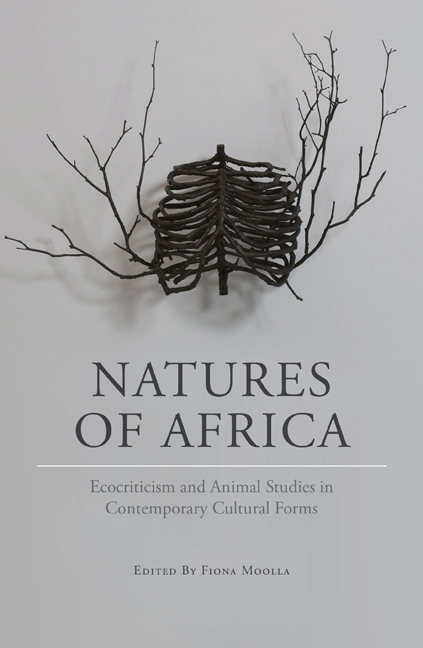Book contents
- Frontmatter
- Table of Contents
- Foreword
- Introduction
- 1 ‘Here is Some Baobab Leaf!’: Sunjata, Foodways and Biopiracy
- 2 Shona as a Land-Based Nature-Culture: A Study of the (Re)Construction of Shona Land Mythology in Popular Songs
- 3 The Environment as Significant Other: The Green Nature of Shona Indigenous Religion
- 4 Animal Oral Praise Poetry and the Samburu Desire to Survive
- 5 The Paradoxes of Voluntourism: Strategic Visual Tropes of the Natural on South African Voluntourism Websites
- 6 Towards an Ecocriticism in Africa: Literary Aesthetics in African Environmental Literature
- 7 Critical Intersections: Ecocriticism, Globalised Cities and African Narrative, with a Focus on K. Sello Duiker's Thirteen Cents
- 8 Navigating Gariep Country: Writing Nature-Culture in Borderline by William Dicey
- 9 Negotiating Identity in a Vanishing Geography: Home, Environment and Displacement in Helon Habila's Oil on Water
- 10 Human Masks? Animal Narrators in Patrice Nganang's Dog Days: An Animal Chronicle and Alain Mabanckou's Memoirs of a Porcupine
- 11 Nature, Animism and Humanity in Anglophone Nigerian Poetry
- 12 Animals, Nostalgia and Zimbabwe's Rural Landscape in the Poetry of Chenjerai Hove and Musaemura Zimunya
- About the authors
- Acknowledgements
- Notes
- Index
11 - Nature, Animism and Humanity in Anglophone Nigerian Poetry
Published online by Cambridge University Press: 10 May 2018
- Frontmatter
- Table of Contents
- Foreword
- Introduction
- 1 ‘Here is Some Baobab Leaf!’: Sunjata, Foodways and Biopiracy
- 2 Shona as a Land-Based Nature-Culture: A Study of the (Re)Construction of Shona Land Mythology in Popular Songs
- 3 The Environment as Significant Other: The Green Nature of Shona Indigenous Religion
- 4 Animal Oral Praise Poetry and the Samburu Desire to Survive
- 5 The Paradoxes of Voluntourism: Strategic Visual Tropes of the Natural on South African Voluntourism Websites
- 6 Towards an Ecocriticism in Africa: Literary Aesthetics in African Environmental Literature
- 7 Critical Intersections: Ecocriticism, Globalised Cities and African Narrative, with a Focus on K. Sello Duiker's Thirteen Cents
- 8 Navigating Gariep Country: Writing Nature-Culture in Borderline by William Dicey
- 9 Negotiating Identity in a Vanishing Geography: Home, Environment and Displacement in Helon Habila's Oil on Water
- 10 Human Masks? Animal Narrators in Patrice Nganang's Dog Days: An Animal Chronicle and Alain Mabanckou's Memoirs of a Porcupine
- 11 Nature, Animism and Humanity in Anglophone Nigerian Poetry
- 12 Animals, Nostalgia and Zimbabwe's Rural Landscape in the Poetry of Chenjerai Hove and Musaemura Zimunya
- About the authors
- Acknowledgements
- Notes
- Index
Summary
In The Future of Environmental Criticism: Environmental Crisis and Literary Imagination, Lawrence Buell (2005: 2) is of the view that ‘if environmental criticism today is still an emergent discourse it is one with very ancient roots. In one form or another the “idea of nature” has been a dominant or at least residual concern for literary scholars and intellectual historians ever since these fields came into being.’
Buell reminds us here that nature has been there since the beginning of life as an object of engagement not only for literary scholars and historians, but also for writers who, in most cases, hardly conceal (and, in most cases, accentuate) their inspirational and intellectual reliance on nature. This fact seems to underline an interesting turn in the interdisciplinary study that has come to be known as ecocriticism, which is the revisionist foregrounding of nature (the earth, the flora and fauna, and other natural objects and phenomena) to draw attention to the phenomenal presence of nature in literatures, oral and written. In other words, ecocritical scholars have in recent times indicated interest not only in how what one might see as a sense of place is organically connected to the life and survival of a people, but also in what I would see as a phenomenology of place – namely that physical settings in literary works could be seen as beings (in the same manner as characters are regarded), having their own destiny in a literary text. For instance, in their introduction to Postcolonial Ecologies: Literature of the Environment, eloquently titled ‘Toward an aesthetics of the earth’, Elizabeth DeLoughrey and George B. Handley (2011) draw attention to Martin Carter's ‘Listening to the Land’ and Chinua Achebe's Things Fall Apart to emphasise, among other things, how land plays an ontological, existential and epistemic role in the lives of the communities captured in those literary works; how land and all the natural objects it contains should be regarded as a being relevant to the collective fate of the communities.
In what has been hitherto seen as the mere natural, physical, even spiritual settings of African literatures, scholars of literature and nature are looking deeper to see the interdependence of culture and nature, and the ontology of nature – the notion that natural objects, like humans, possess a life of their own.
- Type
- Chapter
- Information
- Natures of AfricaEcocriticism and Animal Studies in Contemporary Cultural Forms, pp. 257 - 275Publisher: Wits University PressPrint publication year: 2016



